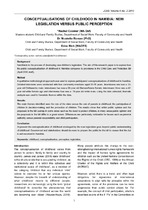Conceptualisations of childhood in Namibia: new legislation versus public perception
Abstract
BACKGROUND: Namibia is in the process of developing new children's legislation. The aim of this research paper
is to explore how the public conceptualisation of childhood in Namibia compares to provisions in
the Child Care and Protection Bill (April 2010 draft). METHOD:
A qualitative methodological approach was used to explore participants’ conceptualisations of childhood in Namibia.
Detailed interviews were conducted with four community members aged 23-75 years. Interviewee one was a 23-
year old Oshiwambo male; interviewee two was a 38-year old Damara/Nama female; interviewee three was a 42-
year old white female age and interviewee four was a 75-year old white male. Using the data collected, thematic
analysis was used to formulate themes within the data.
RESULTS:
The main themes identified were the role of the state versus the role of parents in childhood, the participation of
children in decision-making and the protection of children. The results show that whilst public opinion and the
proposals in the bill overlap in some areas such as the need to protect children, in many areas public opinion and
the proposals in the bill differ to a great extent. Differences are particularly noticeable for issues such as parental
authority versus parental responsibility and child participation.
CONCLUSION:
At present the conceptualisation of childhood envisaged by the new legislation goes beyond public understanding
of childhood. Government and stakeholders should do more to prepare the public for the bill to ensure that the Act
is well-received in Namibia.

